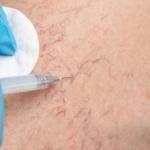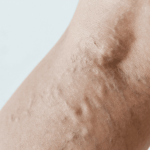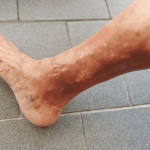
Poor circulation can cause a range of uncomfortable symptoms—cold hands and feet, tingling, swelling, fatigue, and even changes in skin color. While circulation problems are often linked to vein disease or heart conditions, they can also be influenced by certain vitamin and mineral deficiencies.
By understanding these possible nutritional causes—and knowing when your symptoms may be related to vein health—you can take steps toward improving your blood circulation and overall well-being.
Nutritional Deficiencies That May Affect Circulation
Iron Deficiency
Iron is essential for producing hemoglobin, the protein that carries oxygen in your blood. Without enough iron, your tissues may not get the oxygen they need. This can lead to fatigue, weakness, and feeling cold—especially in your hands and feet.
Possible signs:
- Pale skin
- Dizziness or lightheadedness
- Shortness of breath
- Cold extremities
Vitamin B12 Deficiency
Vitamin B12 supports nerve function and red blood cell production. A lack of B12 can cause anemia and nerve-related symptoms that may impact circulation in the legs and feet.
Possible signs:
- Tingling or numbness in hands and feet
- Fatigue or weakness
- Trouble with balance
- Memory changes
Vitamin D Deficiency
Vitamin D helps regulate inflammation and supports healthy blood vessels. Low levels have been linked to reduced blood flow in the legs and increased risk for certain vein problems.
Possible signs:
- Muscle weakness
- Bone pain
- Leg discomfort during walking or standing
Magnesium Deficiency
Magnesium helps blood vessels relax and supports healthy muscle function. Low magnesium can cause blood vessels to constrict, making it harder for blood to circulate effectively.
Possible signs:
- Muscle cramps
- Numbness or tingling
- Irregular heartbeat
When It’s More Than a Deficiency
Improving nutrition can help support circulation in the legs, but persistent symptoms—like leg swelling, aching, or visible varicose veins—may point to an underlying vein condition such as chronic venous insufficiency (CVI). This occurs when the valves in the veins stop working properly, making it harder for blood to return to the heart.
Deficiencies and vein disease can also exist together, so addressing one doesn’t always solve the other. If your symptoms don’t improve after correcting nutritional gaps, it may be worth exploring other causes with a vascular evaluation.
Why a Professional Evaluation Matters
A vein specialist can assess your symptoms, review your medical history, and use diagnostic tools like ultrasound to see how blood is moving through your veins. This can help determine whether your circulation issues are related to nutrition, vein health, or both—so you can address the root cause instead of just the symptoms.
Key Takeaway
Poor circulation can result from vitamin or mineral deficiencies, vein disease, or a combination of factors. Eating a balanced diet rich in iron, vitamin B12, vitamin D, and magnesium is one step toward better circulation. But if you continue to experience leg pain, cold feet, or visible spider veins, it may be time to consult a vein specialist.
Contact USA Vein Clinics today to schedule your vein consultation and take the first step toward healthier legs.





